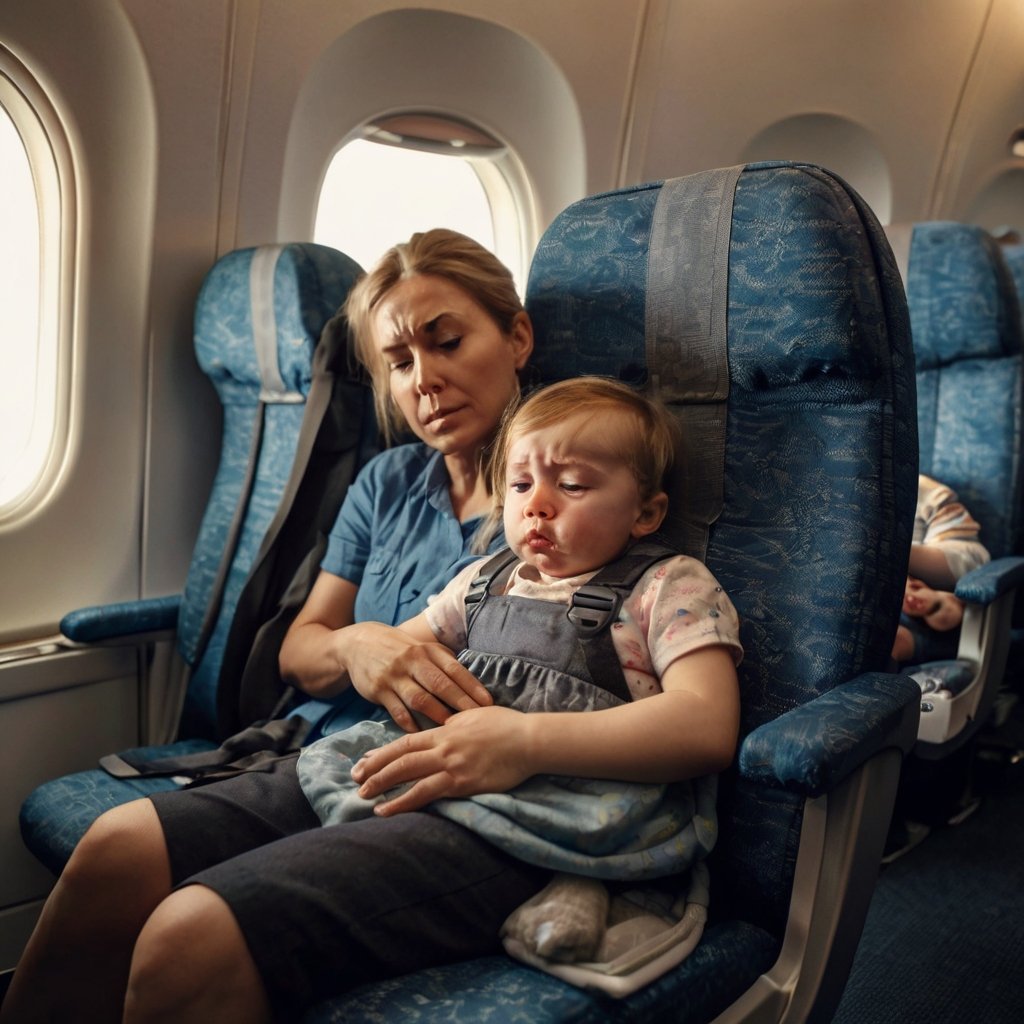Flying with an infant is a fun adventure but can sometimes get very disorganized. I always believed that comfort matters, particularly for long flights, so I decided to pay extra and consider upgrading to first class with a baby for my recent flight. I expected relaxing naps, pleasant amenities, and a serene, hassle-free experience for my infant and myself. But what I did not know was that this upgrade would be a horrible choice I would regret long after the aircraft landed.
If you are a parent, an adventurer, or someone planning a family holiday, I’d like to share with you my honest tale. It is a lesson learned through countless sleepless nights, tears, and many emotional ups and downs. Sometimes what reads well on paper doesn’t quite go as expected when real life kicks in, especially when it comes to the unforeseen challenges of traveling with a toddler.
The Dream of First Class: A Fantasy Come True?
I had pictured myself lying back in a big seat, my infant sleeping serenely in a nice bassinet, while I drank champagne and indulged. I pictured easy travel, with us arriving rested and prepared to begin our vacation. The reality was much more complicated.
I said to myself, “This will be great. My baby deserves the best, and I could use a bit of comfort after sleepless months.” I remember feeling hopeful and also somewhat guilty. I was so happy to spoil my baby a little, even if it would cost me a bit more.
Yet the truth is, no matter how well we plan or how idyllic the destination may seem, traveling with a baby is always an adventure. Babies are not small adults—they have their own schedules, needs, and moods. And sometimes their needs don’t mesh with our plans for comfort and convenience.
The Reality of Upgrading: A Succession of Small Disappointments

The minute I got onto the flight, I knew that this was not going to be the easy ride that I had hoped for. The first sign was the bassinet—it was a nice thought, but my baby would not sleep in it. She cried, she wiggled, and she continued to roll her head as if trying to get away.
I remember feeling helpless and frustrated. I had hoped she would be asleep, peaceful, but she was wide awake, fussy, and crying instead. The peaceful, quiet cabin I had imagined was filled with her small cries of discontent. I tried everything I could think of—feeding, rocking, singing softly—but nothing helped.
The comfortable seats and the additional space for my legs? They made no difference when my baby was upset. Rather than unwind, I was holding her close, feeling even more anxious and guilty. I thought: Did I make the wrong decision? Was this comfort making it harder?
The Emotional Cost: Guilt, Anxiety, and Remorse

It is very tiring to fly with a screaming baby in first class. I apologized for inconveniencing other travelers, even though I knew that it was not my fault. I could see some passengers gazing at me kindly, but others were certainly annoyed. This perception of judgment was hard for me to handle.
I also felt a profound wave of worry. I could not help but ask myself how I had ordered this expensive upgrade, hoping for comfort, and yet here I was with a screaming baby in a closed space. I questioned my choice: Was this actually better? Or was I just wasting money on a problem that nothing luxurious could solve?
I thought long and hard about my regrets. I wondered if I should have just stayed in economy and taken the confusion. Maybe I would have had a more real experience—one with some tears but with real moments of connection and patience.
The Sleep Battles: What Babies Need vs. What Adults Want

One of my main motivations for upgrading was to give my baby a more spacious area to sleep. I pictured her sleeping peacefully in the bassinet and me having a relaxing flight. But in reality, things were very different.
Babies sleep at unusual hours, and airplane cabins, no matter how nice, are noisy, shaky, and full of disagreeable smells. My infant wouldn’t calm down, so I paced the aisle up and down and did my best to soothe her.
The bassinet was too small, the environment was unfamiliar, and her usual sleep cues were disrupted. She was not sleeping but was agitated and could not wind down, and I was extremely exhausted attempting to comfort her. The emotional toll was difficult—I felt helpless and angry, wanting to return to the way things were.
The Root Causes of First Class with a Baby

Aside from the emotional whirlwind, there are a few pragmatic issues that are frequently overlooked when contemplating an upgrade:
- Limited Room for a Baby: In spite of the spacious seats, the cabin is still a small space. It is difficult to change diapers or feed a crying baby.
- Unpredictable Baby Behavior: Babies are not schedule followers or doers of what is expected. Regardless of our preparation, they have their own emotions.
- Alteration to Your Routine: Upgrading usually implies that you anticipate more comfort, yet in actuality, your routine is disturbed. Sleep deprivation and stress can detract from any upscale advantages.
For example, I remember the attempt to change my baby’s diaper in a tiny, rocking airplane bathroom, a less-than-glamorous adventure. It was dirty, hurried, and left me stressed.
Lessons Learned: What I Wish I Had Known Before I Upgraded

In retrospect, I recognize that I upgraded because I needed to feel more at ease and in control. What follows are the things that I wish I had known:
- Luxury Doesn’t Guarantee Peace: No matter how comfortable the seats are, a screaming infant can make any location seem turbulent.
- Flexibility Is Key: Babies are unpredictable creatures, and as such, plans frequently have to change in a hurry.
- Embrace the Chaos and Emotions: Flying with an infant involves tears, tantrums, and less-than-perfect moments—often, these are the most authentic moments.
- Put Your Child First: Comfort for your infant on the road sometimes means familiarity over luxury.
How I Would Do It Differently Next Time
If I had to do it again, I’d focus less on upgrading and more on readying myself for the realities of baby travel. Some strategies I’d use:
- Economy Travel with Extra Comforts: Carrying familiar comfort items, toys, and blankets can make your baby feel more comfortable.
- Plan for Flexibility: Prepare for change and alter your schedule if necessary.
- Travel During Baby’s Sleep Time: If feasible, reserve flights during the time your baby sleeps or naps so that they may sleep more comfortably. – Embrace the Mess: Occasionally, the finest moments are within the messiness—those small, true moments of connection in the midst of tears.
What We Can Learn from Expectations and Reality
Traveling with a small child is one of the most beautiful yet difficult things in life. I tried to upgrade to first class since I hoped it would be more comfortable, but it was a lesson in humility and acceptance.
If you’re thinking of similar upgrades, remember: no amenity can replace patience, flexibility, and a clear understanding of what your child actually needs. Sometimes the most wonderful vacations are the ones where everything doesn’t go exactly as planned—and that’s alright.
Ultimately, the actual moments—those imperfect, tiny, emotional connections—these are what truly make travel valuable. So the next time you feel like splurging on comfort for a bit of extra cash, ask yourself: Is this truly what my family is in need of right now? Oftentimes, the best vacation is the one that forces us to embrace the mess.



